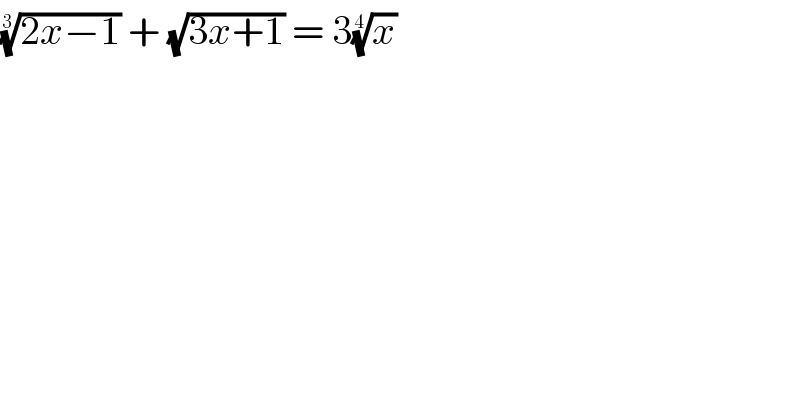
Question Number 62184 by aliesam last updated on 17/Jun/19

$$\sqrt[{\mathrm{3}}]{\mathrm{2}{x}−\mathrm{1}}\:+\:\sqrt{\mathrm{3}{x}+\mathrm{1}}\:=\:\mathrm{3}\sqrt[{\mathrm{4}}]{{x}} \\ $$
Commented by MJS last updated on 17/Jun/19
![x=0 ∨ x=1 trying 2x−1=n^3 ⇒ x=((n^3 +1)/2) then show that f(x)=((2x−1))^(1/3) +(√(3x+1))−3(x)^(1/4) has a minimum in [0; 1] and it is increasing for x>1](Q62194.png)
$${x}=\mathrm{0}\:\vee\:{x}=\mathrm{1} \\ $$$$\mathrm{trying}\:\mathrm{2}{x}−\mathrm{1}={n}^{\mathrm{3}} \:\Rightarrow\:{x}=\frac{{n}^{\mathrm{3}} +\mathrm{1}}{\mathrm{2}} \\ $$$$\mathrm{then}\:\mathrm{show}\:\mathrm{that} \\ $$$${f}\left({x}\right)=\sqrt[{\mathrm{3}}]{\mathrm{2}{x}−\mathrm{1}}+\sqrt{\mathrm{3}{x}+\mathrm{1}}−\mathrm{3}\sqrt[{\mathrm{4}}]{{x}} \\ $$$$\mathrm{has}\:\mathrm{a}\:\mathrm{minimum}\:\mathrm{in}\:\left[\mathrm{0};\:\mathrm{1}\right] \\ $$$$\mathrm{and}\:\mathrm{it}\:\mathrm{is}\:\mathrm{increasing}\:\mathrm{for}\:{x}>\mathrm{1} \\ $$
